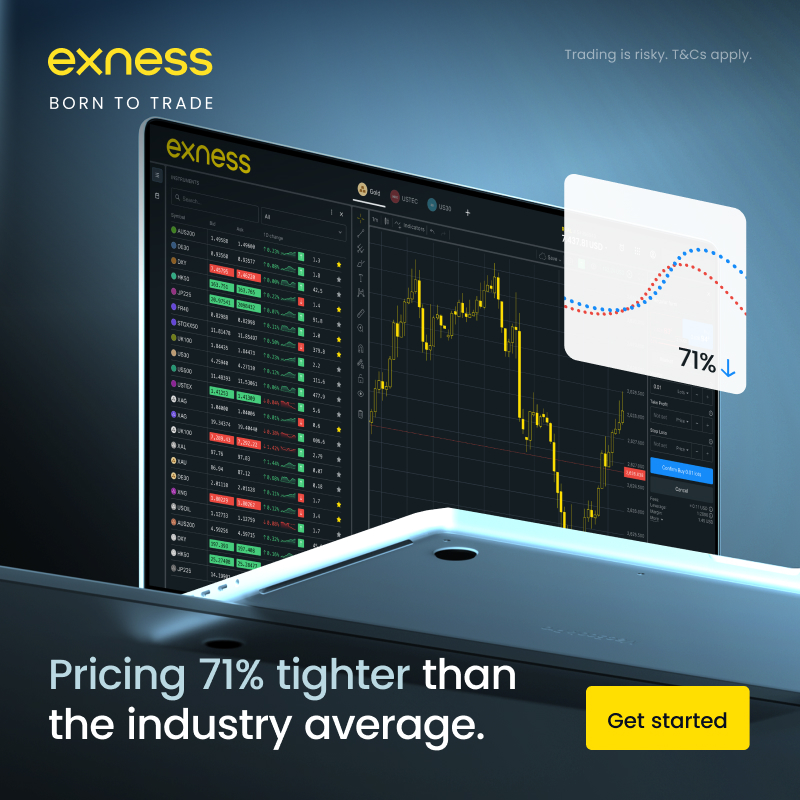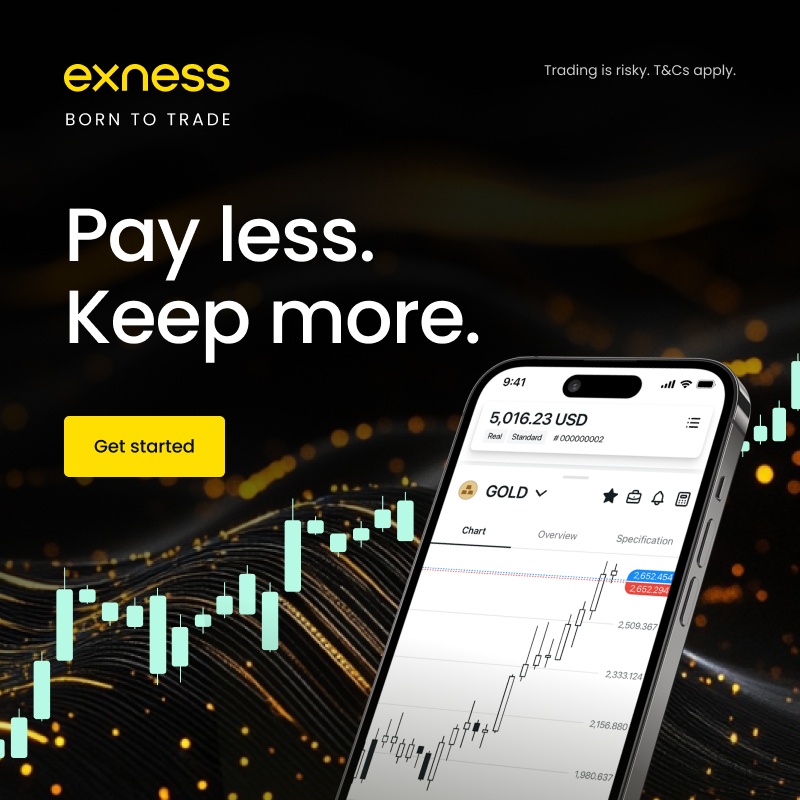
7 minute read
Is Exness Legal in Ethiopia? Everything You Need to Know
from Exness
by Exness Blog
If you are searching for a direct answer to the question “Is Exness legal in Ethiopia?”, here it is: Yes, Ethiopian residents can legally trade with Exness, but the broker is not regulated by the National Bank of Ethiopia (NBE). Instead, Exness operates under well-established international licenses.
✅ Trade with Exness now: Open An Account or Visit Brokers 👈

This article will explore in detail what that means. We’ll cover Ethiopia’s forex laws, Exness’s global regulatory framework, the realities of using Exness from Ethiopia, the risks you should be aware of, and practical recommendations for safe trading. By the end, you’ll know exactly where Exness stands in the Ethiopian financial landscape.
1. The Legal Framework of Forex Trading in Ethiopia
To understand Exness’s status, it’s essential to know how foreign exchange is regulated in Ethiopia.
The National Bank of Ethiopia (NBE) is the sole authority responsible for regulating financial institutions and setting foreign exchange policies.
The Ethiopian Birr (ETB) is not freely convertible. This means residents face strict restrictions when exchanging ETB for USD, EUR, or other currencies used in forex trading.
Forex trading is not banned. Ethiopians are not prohibited from opening accounts with international brokers. However, NBE rules around cross-border payments and capital flows must be respected.
Tax obligations apply. Profits from trading are taxable under the Ethiopian Revenue and Customs Authority (ERCA). Traders are expected to declare and pay tax on earnings from forex activities, even if those earnings are kept abroad.
In short, forex trading in Ethiopia exists in a grey zone: allowed but not locally regulated. This is where brokers like Exness come into play.
2. Exness’s Global Regulatory Standing
Exness is one of the world’s most widely recognized forex brokers, serving millions of clients across different regions. Although it has no license from the NBE, it is regulated internationally by several top-tier and mid-tier financial authorities.
Exness holds licenses from:
Cyprus Securities and Exchange Commission (CySEC) – covers European Economic Area.
Financial Conduct Authority (FCA), UK – one of the strictest regulators worldwide.
Financial Services Authority (FSA), Seychelles – allows offshore operations globally.
Financial Sector Conduct Authority (FSCA), South Africa – adds credibility for African traders.
Capital Markets Authority (CMA), Kenya – ensures compliance in East Africa.
Financial Services Commission (FSC), British Virgin Islands & Mauritius – additional international oversight.
These licenses mean that Ethiopian traders are legally able to open Exness accounts, but they do so under the protection of offshore or international regulatory entities, not under Ethiopian law.
3. Is Exness Legal for Ethiopians?
The answer is yes, with conditions:
Exness is not banned in Ethiopia. Its website and platforms are accessible without restriction.
Ethiopian traders are free to open accounts and use the broker’s services.
The legality comes from the fact that Exness operates under international law, not because of NBE oversight.
This is different from domestic banks or financial institutions that must hold an NBE license. Exness operates in Ethiopia in the same way it does in many other emerging markets where local regulators have not yet created a detailed framework for online forex brokers.

✅ Trade with Exness now: Open An Account or Visit Brokers 👈
4. Practical Considerations for Ethiopian Traders
Even though Exness is legal to use, Ethiopian traders face unique challenges that affect how they trade.
a. Funding Accounts
Since the Ethiopian Birr is restricted, you cannot directly deposit ETB into Exness.
Instead, you must use international payment channels such as Visa, Mastercard, Skrill, Neteller, or cryptocurrencies like Bitcoin.
Some traders rely on peer-to-peer exchanges or informal intermediaries, but these methods carry extra risk.
b. Withdrawals
Exness is well-known for fast withdrawals, often processed instantly for e-wallets.
However, Ethiopian traders must plan how to receive funds in USD or another currency, then convert to ETB in compliance with NBE rules.
c. Tax Compliance
Any profit made must be reported to ERCA.
Failing to declare income can lead to penalties if detected.
Keeping clear transaction records is advisable.
d. Language and Support
In 2025, Exness officially introduced Amharic language support for both its platform and customer service.
This localization makes it easier for Ethiopian clients to understand contracts, risk warnings, and technical details.
5. Advantages of Trading with Exness in Ethiopia
Despite regulatory limitations, Exness brings several benefits to Ethiopian traders:
Strong global regulation – protection under CySEC, FCA, and other authorities.
Low trading costs – spreads are competitive, and commissions on some accounts are minimal.
Diverse instruments – access to forex, metals, indices, cryptocurrencies, and energies.
Multiple platforms – MT4, MT5, web terminal, and mobile apps.
Amharic support – rare among international brokers, showing commitment to Ethiopian clients.
Transparent operations – Exness regularly publishes audited financial statements.
These features make Exness particularly attractive for traders who want a blend of security, low costs, and accessibility.
6. Risks and Challenges to Consider
However, no broker is perfect, and Ethiopian traders must weigh risks carefully.
a. Lack of Local Oversight
Since Exness is not regulated by NBE, there is no local authority to resolve disputes. Ethiopian traders must rely on international regulators, which may complicate complaints.
b. Currency Restrictions
Moving funds in and out of Ethiopia can be difficult. Some banks question forex-related transfers, and there may be delays in converting USD back to ETB.
c. Mixed User Reviews
On forums like Reddit, some traders complain about:
Difficulties closing positions during high volatility.
Stop-loss orders triggering earlier than expected due to spread widening.
Slow or unhelpful customer support in some cases.
At the same time, many long-term users praise Exness for reliable withdrawals and regulatory transparency.
d. Trading Risk
Forex itself is inherently risky. Leverage can magnify losses as well as profits. Without proper risk management, Ethiopian traders may face significant financial harm.
7. Ethiopia’s Forex Market Outlook
Ethiopia’s financial sector is still in the process of opening up. The government has shown interest in liberalizing forex and banking regulations, but progress is gradual.
Digital finance is expanding. Mobile banking and fintech services are growing, which could make international trading easier in the future.
Regulatory modernization is expected. NBE may eventually introduce specific guidelines for online brokers, similar to Kenya’s CMA.
Demand is rising. Young, tech-savvy Ethiopians are increasingly interested in forex and crypto trading, creating a natural market for brokers like Exness.
This means Exness’s presence in Ethiopia today could be just the beginning of a much larger role in the years ahead.
8. Recommendations for Ethiopian Traders
If you plan to trade with Exness from Ethiopia, keep these guidelines in mind:
Start small. Test deposits and withdrawals before committing larger amounts.
Use official payment channels. Avoid unreliable intermediaries when funding accounts.
Keep records. Document every transaction to stay tax-compliant.
Understand the risks. Learn about leverage, margin calls, and market volatility.
Seek advice. Consult with financial professionals on taxation and compliance.
Diversify. Don’t put all savings into forex—spread your investments to reduce risk.
9. Final Verdict: Is Exness Legal in Ethiopia?
To wrap up: Yes, Exness is legal to use in Ethiopia. Ethiopian traders can freely open accounts, deposit funds, and trade through Exness. The broker is not regulated by the National Bank of Ethiopia, but it is heavily licensed and supervised internationally.
This setup gives Ethiopian traders access to a reputable, secure broker, though it also requires extra care with currency conversions, tax compliance, and risk management.
Exness’s expansion into Ethiopia—with Amharic language support and multiple trading platforms—shows it is serious about serving local traders. Still, because forex is complex and carries risk, Ethiopians should proceed with caution, informed decision-making, and responsible financial practices.
✅ Trade with Exness now: Open An Account or Visit Brokers 👈
Read more:










